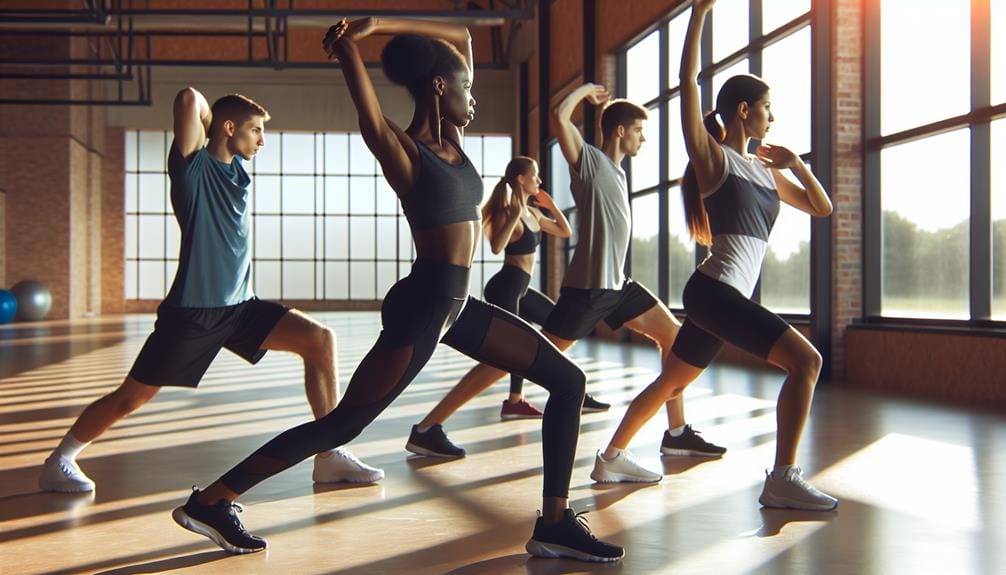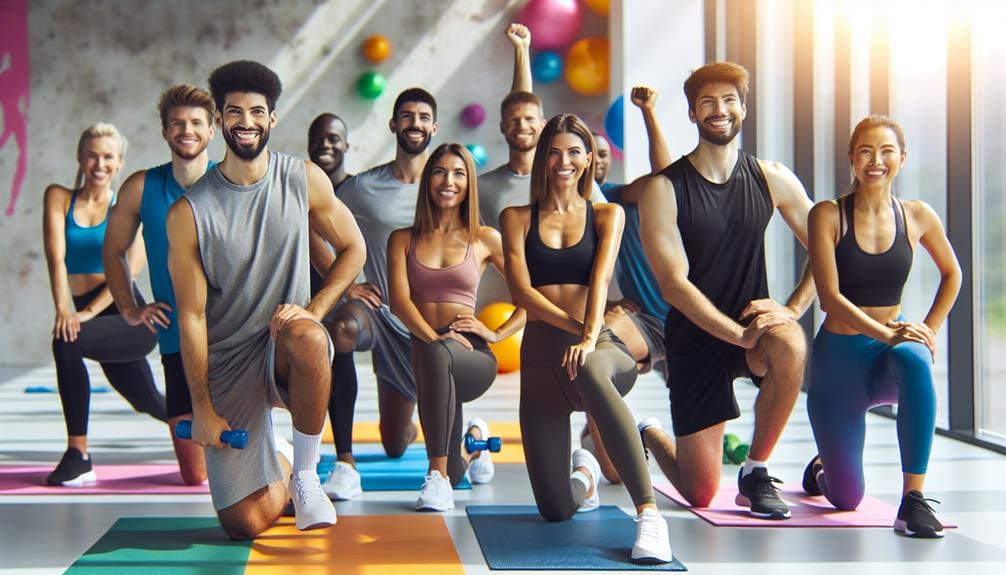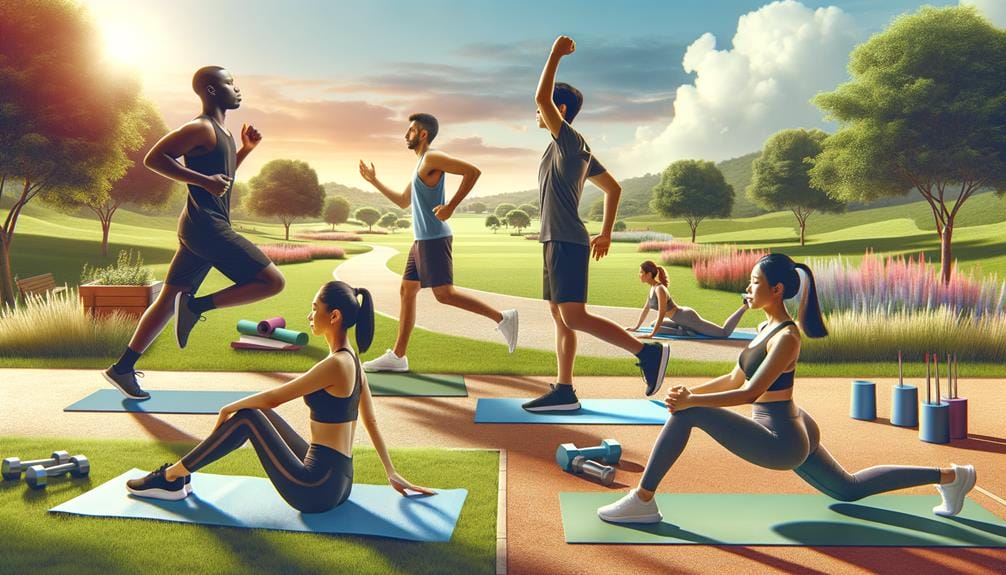Starting a fitness journey? Focus on easy exercises like bodyweight squats, lunges, and push-ups. These moves engage multiple muscle groups and improve overall strength. Incorporate planks to tone your core and enhance stability. Remember to set clear goals and track your progress using a journal or app. Importance is essential, so develop a routine that includes cardio, strength training, and flexibility exercises. Stay hydrated and maintain a balanced diet to support your workouts. Don’t forget to warm up to prevent injuries. By following these tips, you’ll be on the path to a healthier lifestyle and uncover more effective workout strategies.
Key Takeaways
- Start with bodyweight exercises like squats and lunges to build foundational strength.
- Incorporate push-ups and planks to strengthen the upper body and core.
- Use light dumbbells for exercises such as shoulder presses and dumbbell rows.
- Include cardio activities like brisk walking or light jogging to improve cardiovascular health.
- Focus on proper form and technique to prevent injuries and maximize benefits.
Health Check
Before starting a new fitness routine, it’s important to get a health check from your healthcare provider. Think of it as making sure your car is road-ready before a long trip. Your healthcare provider will identify any underlying conditions or limitations that could affect your exercise plans.
You wouldn’t want to discover halfway through your routine that your knees hate squats, right? This health check guarantees the safety and suitability of your personalized exercise plan. It’s like having a custom blueprint for your fitness journey.
Plus, regular check-ups help you monitor progress and tweak your exercise routine as needed. So, don’t skip this step—your future fit self will thank you for it!
Setting Goals

To start your fitness journey, establishing clear objectives is essential.
You’ll need to track your progress and celebrate small wins to stay motivated.
Define Clear Objectives
Setting clear exercise goals keeps you focused and motivated throughout your fitness journey. For beginners, defining objectives is essential. Your workout goals should be SMART:
- Specific: Know exactly what you want to achieve.
- Measurable: Use numbers to track progress.
- Achievable: Set goals within your reach.
- Relevant: Make sure your goals match your fitness interests.
- Time-bound: Set a deadline to stay motivated.
Want to lose weight? Aim for a specific number of pounds by a certain date. Trying to build muscle? Set a target for how much you want to lift. Remember, your goals should be realistic to avoid frustration. Progress tracking will help you stay on course and see how far you’ve come.
Track Your Progress
Monitoring your progress is essential for staying motivated and seeing the benefits of your beginner workouts. Start by setting specific goals and measurable objectives. Got dreams of running a marathon? Maybe focus on surviving a 5K first.
Track your progress with a workout journal or a nifty app; it’s like a diary, but for your muscles. By setting achievable goals in small increments, you’ll witness fitness improvements without feeling like a fitness failure.
Regularly evaluating progress allows for adjusting goals, ensuring continuous growth. Remember, this isn’t a race; it’s a journey. So, keep those goals realistic and celebrate every little victory along the way. You’ve got this—one rep at a time!
Celebrate Small Wins
Recognizing and celebrating small wins can greatly boost your morale and keep you committed to your fitness journey. As beginners, it’s important to acknowledge even minor victories to stay motivated and build confidence.
Each small win, whether it’s completing a workout or perfecting your form, reinforces the habit of exercise and leads to long-term success. This positive feedback loop helps maintain consistency and guarantees you stay on track.
To help you celebrate those small wins, try these:
- Reward yourself with a new workout playlist.
- Treat yourself to a healthy snack.
- Share your progress with friends or on social media.
- Give yourself a day off from chores.
- Buy a new piece of workout gear.
Creating a Routine

Creating a workout routine is essential for consistency. Start by setting aside dedicated time for exercise each week. Aim for at least 2-3 days to build a habit. Balance different types of workouts to target various muscle groups.
Remember to tailor your routine to your fitness level and goals. Gradually increase intensity and duration.
Consistency Is Key
Establishing a consistent exercise routine is essential for building lasting fitness habits and achieving your goals. By sticking to a regular workout schedule, you’ll improve adherence and see progress in no time. Plus, you’ll be more motivated and accountable when your routine becomes second nature.
A consistent plan can also boost your energy levels, making you feel like a superhero in your everyday life. Here are some tips to help you stay on track:
- Set specific workout times each day.
- Mix up your exercises to keep things interesting.
- Find a workout buddy for added accountability.
- Reward yourself for meeting milestones.
- Track your progress and celebrate small victories.
Stick with it, and you’ll be crushing your fitness goals before you know it!
Balance Different Workouts
To build a balanced workout routine, incorporate a mix of cardio, strength training, and flexibility exercises. Think of it like a fitness buffet—you want a bit of everything!
Include stability exercises like planks or single-leg stands to keep your coordination sharp and prevent injuries. Rotate different exercises to target various muscle groups and avoid hitting a progress plateau.
Mixing high-intensity workouts like HIIT with low-impact activities like yoga guarantees variety and recovery. Consistency is key; diverse workouts keep you interested, so you’re less likely to ditch your routine.
A balanced approach promotes overall fitness development and keeps your muscles guessing. So, ditch the monotony and embrace the smorgasbord of sweat!
Staying Hydrated

Regularly staying hydrated is essential during exercise to regulate your body temperature and maintain peak performance. Without proper hydration, you risk muscle cramps and reduced exercise capacity. Drink water before, during, and after workouts to replace fluids lost through sweat.
For longer, intense workouts, consider electrolyte drinks to replenish sodium and potassium levels. Monitoring your urine color is a simple way to gauge your hydration status—aim for pale yellow to clear.
Here are some tips to stay properly hydrated:
- Drink up: Keep a water bottle handy.
- Electrolyte boost: Use sports drinks for intense sessions.
- Check your pee: Aim for pale yellow.
- Snack smart: Eat water-rich fruits like watermelon.
- Set reminders: Use phone alarms to drink regularly.
Stay hydrated and keep those muscles happy!
Optimal Nutrition

Achieving peak nutrition is essential for maximizing your exercise performance and recovery. Think of it as your workout’s secret sauce.
A balanced diet packed with essential nutrients is your best friend, ensuring you’ve got the energy to crush those workouts and the goodies needed for muscle repair.
Don’t skimp on protein intake; it’s like the duct tape for your muscles. Hydration is just as vital—nobody wants to be that person who faints at the gym.
Carbohydrates in your pre-workout meals can fuel workouts and support endurance, so you can channel your inner superhero.
Warming Up

Before you jump into your workout, warming up is key to preparing your body for the physical demands ahead. A proper warm-up increases blood flow, improves flexibility, and helps prevent injuries.
Start with light cardio, like jogging in place or doing jumping jacks, to raise your heart rate. Incorporate dynamic stretches, such as leg swings and arm circles, to enhance your range of motion. These warm-up exercises also aid in muscle activation, making your workout more efficient.
- Leg Swings: Swing one leg forward and backward to loosen up.
- Arm Circles: Rotate your arms in small circles, then gradually make them larger.
- Jumping Jacks: Classic but effective for getting the blood pumping.
- High Knees: March or jog in place, lifting your knees high.
- Butt Kicks: Jog in place, bringing your heels to your glutes.
Beginner-Friendly Exercises

Beginner-friendly exercises like squats, lunges, push-ups, and planks are essential for building a strong fitness foundation. These exercises use your body weight and target multiple muscle groups, making them perfect for a full-body workout.
When you’re starting, focus on proper form to avoid injuries and maximize benefits. Squats and lunges improve lower body strength, while push-ups and planks work your upper body and core.
Don’t worry about looking like a fitness model; consistency and gradual progression are key. Beginner workouts help you establish a routine and build muscle mass over time.
Conclusion
Starting a fitness journey might seem challenging, but you can do it. By following these beginner-friendly exercises, setting achievable goals, and maintaining proper nutrition, you’ll build a strong foundation.
Don’t worry if you feel unsure; everyone starts somewhere. Stay consistent, hydrate well, and warm up before each session to avoid injuries.
Remember, progress takes time, but with dedication and the right approach, you’ll see improvements and feel healthier. Keep pushing forward, you’ve got this!








Leave a Comment